
No ifs, no buts - and no ...ands: The star quality of June Whitfield
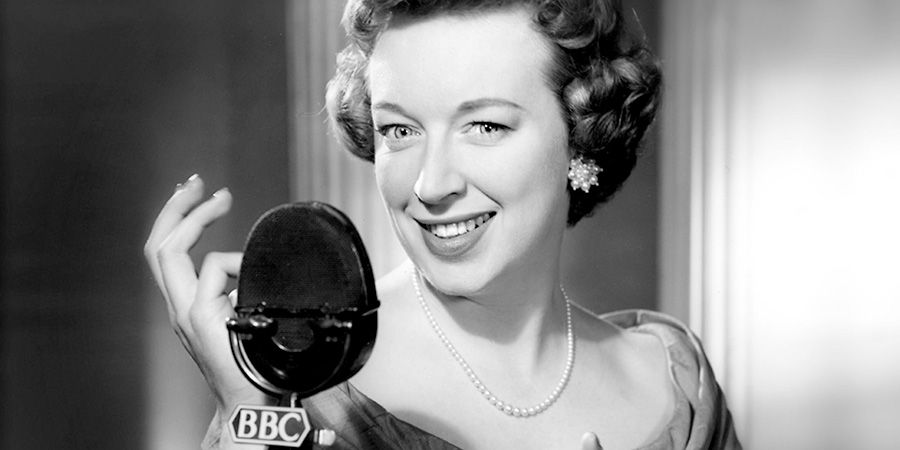
June Whitfield and David Jason. If ever one needs a pertinent comparison to analyse the imbalance of opportunities between men and women in British comedy over the past half century or so, then this one, I would argue, is the one to study.
Both of these performers were supremely gifted comic character actors. They had all the talent, the timing, the technique and the temperament to make it as two of the greatest stars of their time on television. Only one, however, was assisted institutionally towards that goal. The other one was just taken for granted.
David Jason was regarded as a star in the making from a fairly early age. It actually became something of a talking point in the tabloids as to how assiduously both the BBC and ITV were searching for the right vehicle with which to help him realise his full potential. One bespoke show after another was tried out as a means to make him a star.
It was different for June Whitfield. It always had been, it always would be.
She was never treated in such a positive and encouraging way. She was always treated as either merely one of the supporting cast or as a sidekick to a male star (as Barry Took once put it, 'She supported more actors than the dole office').
The upshot was that David Jason finally had his well-deserved breakthrough as Del Boy in Only Fools And Horses, with all of the triumphs and tributes that followed, while June Whitfield continued to be, as the title of her autobiography put it so pointedly, ...And June Whitfield - a support to a male star.
This is not, in any way, to suggest that the now Sir David Jason has not earned his lofty position in the history of British comedy. He clearly has. It is just to reflect on the fact that his comic equal, June Whitfield, deserved to be there alongside him.
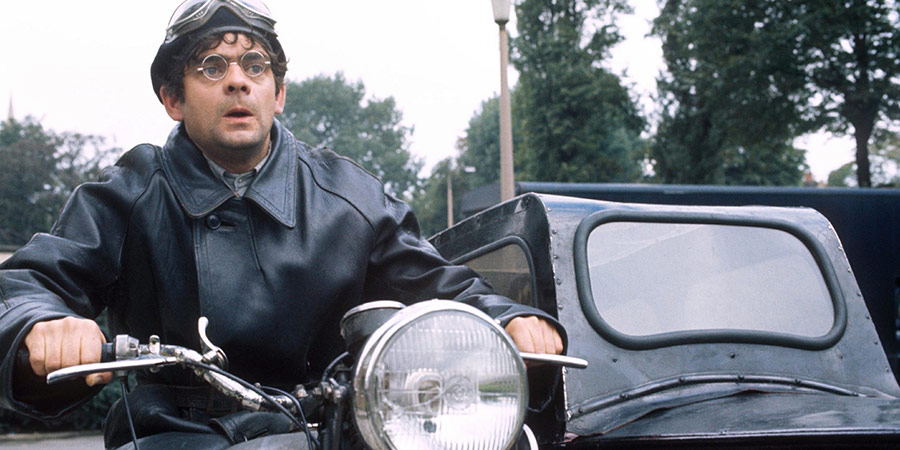
Why didn't she get there? It is hard to look beyond her sex to explain that. She and Sir David lived and worked in an era of entertainment (and comedy in particular) when the men were looked at for their star potential and the women for their supportive potential.
That is hard to take generally, but it is especially hard to take when one ponders a performer as gifted as June Whitfield. She should never have been an '...and June Whitfield'. She should have been a 'June Whitfield and...'
Born in Streatham, south London, in 1925, she grew up in a family of keen am-drammers, but was encouraged to train as a secretary before winning a place at RADA in 1942, where her contemporaries included Richard Attenborough, Miriam Karlin and Bryan Forbes. Right from the start, she was drawn to comedy rather than drama. 'I always hated the idea of taking myself too seriously,' she would say, 'and, as a result, I developed a kind of aversion to heavy, serious roles; it was lack of self-confidence really.'
Years of touring followed, a treadmill of training, until she was 'discovered' by Noël Coward, who cast her in his 1950 musical Ace Of Clubs. That led to her getting a role, three years later, on the popular BBC radio comedy show Take It From Here.
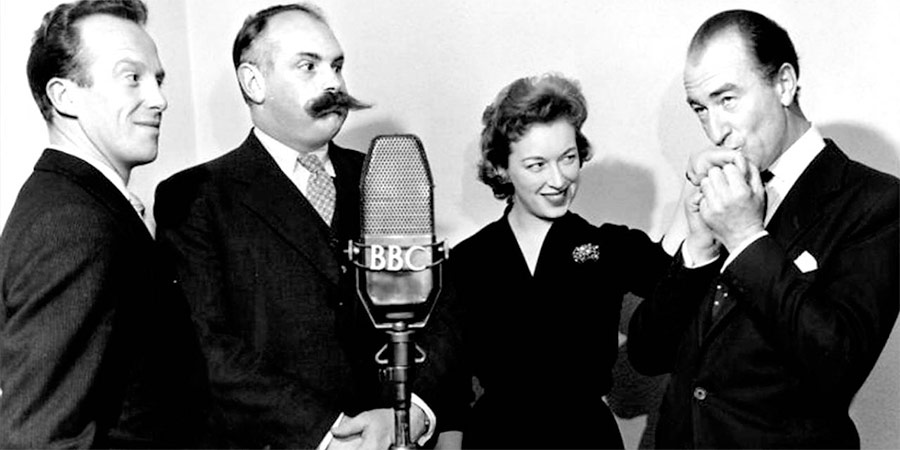
Broadcast since 1948, this programme had recently lost the comedian and singer Joy Nichols from its cast of regular performers, and so the writers, Frank Muir and Denis Norden, decided to split her role in future and thus hired Alma Cogan (known as 'The Girl with the Giggle in her Voice') to do the singing and June Whitfield to do the comedy. It worked brilliantly (with an estimated 20 million listeners tuning in each week), and Whitfield shone especially as 'Eth' - opposite Dick Bentley as her dim-witted boyfriend 'Ron' and Jimmy Edwards as his irascible father - in the show's regular mini-sitcom, 'The Glums':
ETH: Oh, Ron...don't think I'm trying to pry, but - is everything all right? I mean, the whole evening you've been, sort of, wrought-up. Have you got anything at all on your mind?
RON: No, Eth.
ETH: Dearest, I don't want to appear to doubt your word, but...that hammer. Every time you think I'm not looking, you go over to the mirror and hit yourself on top of the head with it. Beloved, I think I'm entitled to ask - why?
RON: My bed's too short.
ETH: You're fibbing, aren't you, Ron?
RON: Yes, Eth.
ETH: Dearest, unless you confide in me, I can't help you. And if you want my opinion, this hitting yourself on top of the head with a hammer indicates you're in a very highly-strung state of tension. You do get that in sensitive people. So, Ron, you're going to tell me, whether you like it or not!
RON: All right, Eth.
ETH: Well..?
RON: I don't like it, Eth.
ETH: Then why keep doing it, dearest heart?
RON: I've got to, Eth. It's the only way to...solve my problem.
ETH: Ah! So there is a problem! I thought you wouldn't keep hitting yourself on top of the head with a hammer unless there was some good reason. Dearest, won't you let me help you?
RON: If you like, Eth. [He hands her the hammer]
ETH: Not hit you - solve your problem!
RON: That will solve it, Eth. If I'm hit on top of the head with a hammer long enough - I won't have my problem.
ETH: You won't have your head, either! Ron Glum, you are going to tell me here and now - what kind of problem has made you take to hitting yourself on top of the head with a hammer? Is it...some form of guilt?
RON: No, Eth.
ETH: Family trouble?
RON: No, Eth.
ETH: An...affair of the heart?
RON: No, Eth.
ETH: Then what?
RON: ...I've got a sixpence stuck up my nose.
After Take It From Here and 'The Glums' (which would have such a broad and lasting cultural impact that, many years later when she finally received her well-deserved DBE, The Queen looked at her and whispered: 'Ooooh, Ron!'), it was as if June Whitfield had been injected into the bloodstream of British comedy. For the next five decades or so she seemed to be everywhere.
She worked with Frankie Howerd, Tony Hancock, Tommy Cooper, Benny Hill, Morecambe & Wise, Peter Sellers, Eric Sykes, Spike Milligan, Arthur Askey, Stanley Baxter, Harry Worth, Bernie Winters, John Cleese, Cannon & Ball, Brian Rix, Mike Yarwood, Julian Clary, Dick Emery, Peter Jones, Sid James, Kenneth Williams, Terry Scott, Bob Monkhouse and Roy Hudd. She was one of Harold's girlfriends in Steptoe And Son; Marlene's mother in The Green Green Grass; Tony's assistant in Hancock's; Edina Monsoon's mother in Absolutely Fabulous; Pearl's comrade-in-arms in Last Of The Summer Wine; and a toffee-nosed housekeeper in Friends. She was in sitcoms and Carry Ons, sketch shows and panel shows, one-off specials and long running series.
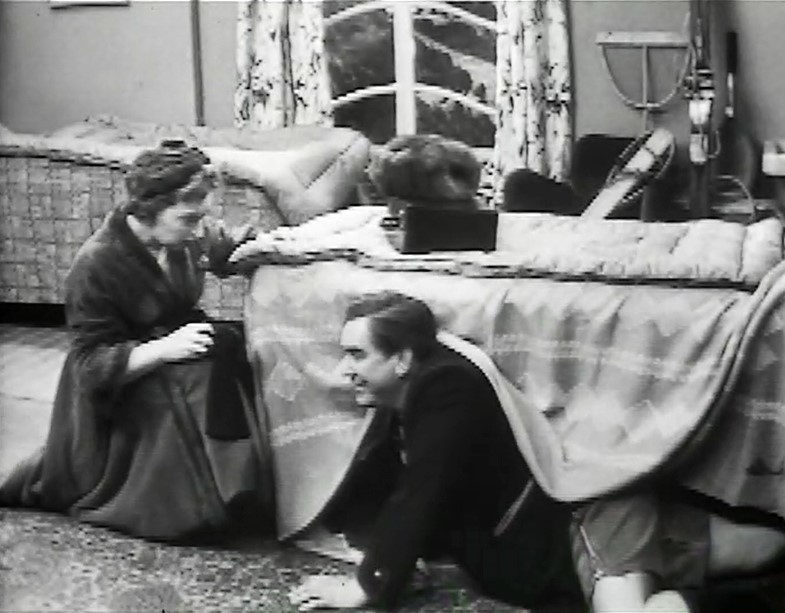
There was very little that June Whitfield couldn't do. She was pitch perfect in the Hancock's Half Hour episode entitled The Alpine Holiday (1957) as the sweet-natured but demure young Frenchwoman, Miss Dubois, who arrives by mistake in Hancock's hotel room just as he emerges from inspecting the springs under his bed:
HANCOCK: Good evening.
DUBOIS: [Sarcastically] Oh, don't tell me - you are under there looking for a squeak?
HANCOCK: Yes.
DUBOIS: 'Yes?' Get out from under my bed!!!
HANCOCK: Your bed? This is my bed - you're having the one over there!
DUBOIS: I beg your pardon?
HANCOCK: Do you mind? I have bagged this bed - don't covet it now! And I hope you don't snore - I'm a very light sleeper!
DUBOIS: How DARE you! Get out of this room at once! I know your type - creeping into a girl's room, y-y-y-you peeping Tim!
HANCOCK: 'Peeping Tim'? Don't give me that stuff! There's nothing unusual for you continental ladies. What? I've been to Boulogne! Now, let's face the truth, now - we're sharing this room for a fortnight, let's make the best of it, if you get my meaning.
DUBOIS: I get your meaning - now you get out!!!
HANCOCK: Come now, I admit this is a little irregular, not the sort of arrangement one might find in Market Harborough, nevertheless I am quite prepared to put up with the inconvenience.
DUBOIS: Yes, but I am not! Now are you going?
HANCOCK: Please madam, you've nothing to fear from me - I'm British! British through and through! Let's be broad-minded about this. Now, you scratch my back, and I'll scratch yours.
DUBOIS: You are not scratching MY back!
HANCOCK: It's a figure of speech, madam, you mistake my meaning - I'm only here for the winter sports!
DUBOIS: Yes, but I am not one of them - NOW GET OUT!!!
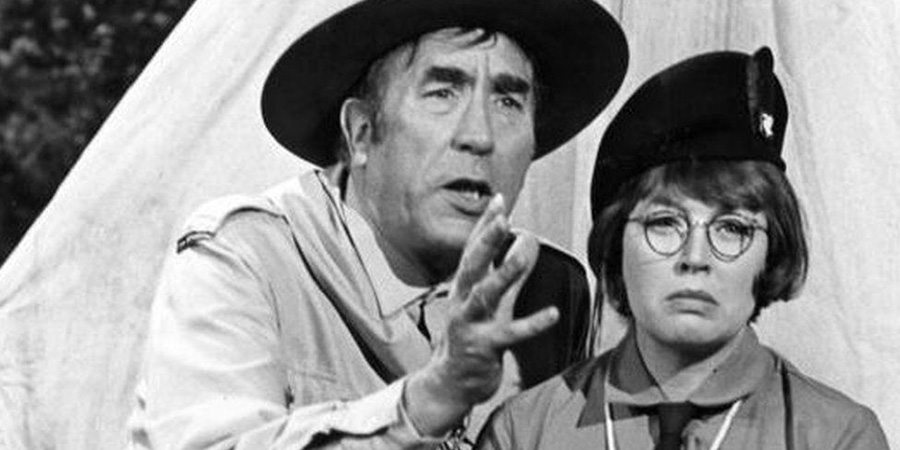
She was equally impressive in The Frankie Howerd Show (1964-6) as Beryl Cuttlebunt, a mercurially neurotic upper-class aesthete Howerd meets via a dating agency. Beryl is an elegant, cultured, darkly-troubled creature who quickly reduces Howerd to a nervous wreck. When he moves to shake her hand, she recoils in horror - 'Don't touch me, I can't stand men touching me!' - but, after asking for patience ('Be kind to me. Don't rush me'), and briefly suspecting him of drugging her blackcurrant bonbons, she starts rhapsodising about Sartre, Stendhal, Baudelaire and Rilke, and then, quite suddenly, she pounces:
BERYL: Make love to me!
FRANKIE: Yes. Pardon???
BERYL: Make LOVE to me!
FRANKIE: What - now?
BERYL: Yes! Here and now!
FRANKIE: What - do you mean in broad daylight? In the Tate Gallery??
BERYL: Yes!
FRANKIE: Oooh, I couldn't do that! Let me go! Don't touch me, please!!
BERYL: Kiss me! Violently and passionately!
FRANKIE: Madam, madam!!! Oooh, naughty madam - please! Control yourself! It's worse than Peyton Place!
BERYL: Kiss me! Kiss me!! BITE me!
FRANKIE: BITE you???
BERYL: BITE ME!!
FRANKIE: Ooh, I can't, dear, I'm a vegetarian!
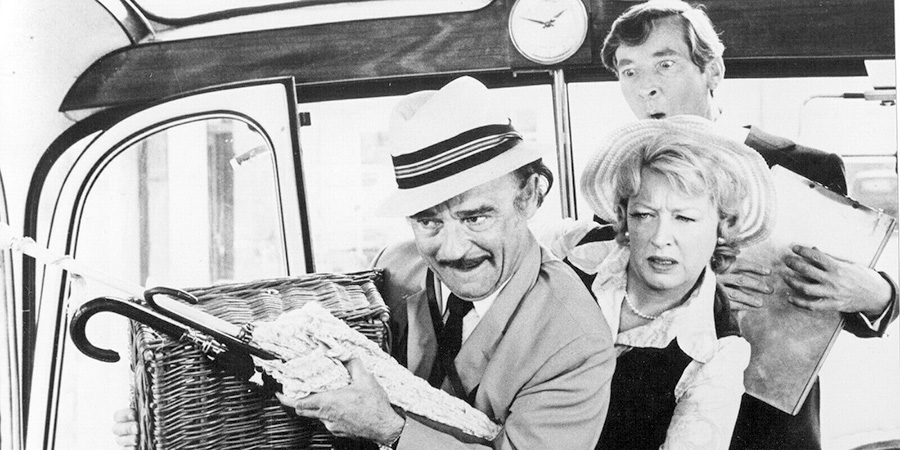
She was also excellent as Evelyn Blunt, the bossy, prudish, deeply-repressed middle-class wife of Kenneth Connor's timidly romantic Stanley in Carry On Abroad (1972). Straight-backed and sad-eyed, she doesn't drink ('I tried it once and didn't like it), doesn't smoke ('I tried it once and didn't like it), and, of course, has only the one child:
EVELYN: Well, I for one think it is absolutely outrageous asking us to share a room just because we're married!
STANLEY: Well, ah, I don't know, dear, I thought it was quite reasonable in the circumstances.
EVELYN: Oh, yes, I noticed you didn't offer any resistance. Any man with half an ounce of gumption would have refused!
STANLEY: Ha-ha, um, ah, actually, I thought it might be quite...fun.
EVELYN: Fun? FUN??
STANLEY: Well, after all, it is quite some time since we did it. Er, shared a room, I mean.
EVELYN: Stanley, you're not going to try to use this as an excuse to start that nastiness again!
There was very little that June Whitfield couldn't do, but there was a lot that she wasn't encouraged to do. While David Jason, on his way up, was allowed to use the full range of his comic talents - he had, for example, played multiple characters from the surreal to the slapstick in Do Not Adjust Your Set (1967-9); an incoherent 100-year-old gardener named Dithers in the 1972 Ronnie Barker sitcom His Lordship Entertains, and the wistful old inmate called Blanco in Porridge (1974-7); a mother-coddled young northerner in It's Only Me - Whoever I Am (1974); an action-orientated but hopelessly inept secret service agent in The Top Secret Life Of Edgar Briggs (also 1974); and a dopey but romantic younger brother in Lucky Feller (1975-6) - Whitfield continued to be left to make the most of a much narrower selection of rigid female stereotypes.
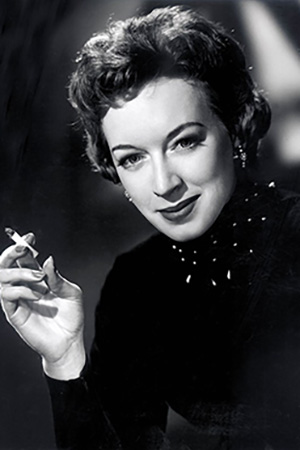
This bias in favour of male performers was evident all the way up to the executive level. When, for example, Jimmy Gilbert became the BBC's Head of Comedy in 1973, for all of his many admirable qualities, he was still enough of a product of his time to think only in terms of men when it came to considering whom he most wanted to mould or maintain as stars. 'The top five,' he would later recall, 'were: Ronnie Barker, Richard Briers, Ronnie Corbett, Leonard Rossiter and David Jason.'
June Whitfield was admired and respected up to a point, but not enough to be considered for inclusion alongside her male contemporaries as their equal. The glass ceiling, for her, was just beneath that top level, which would mean that, no matter how good she was, from one show to the next, she would have to keep on playing, at best, second fiddle to a man - or, more specifically, to Terry Scott.
Terry Scott was already regarded as a star when he came to work with Whitfield. He had enjoyed big hits with such sitcoms as Scott Free (1957) and Hugh And I (1962-8), alongside such intriguing experiments as The Gnomes Of Dulwich (1969), as well as featuring in several Carry On movies. Whitfield was first brought in as one of the supporting players in the sketch show Scott On... (1968-74), and proved herself, as she had done so many times before, an exceptionally able and versatile comic feed and foil.
Scott was actually a rather more limited and stylised comic performer than Whitfield - as predictable as she was protean - but, as the star, he was used to dominating and driving the scripts. He was also someone who was notorious for his volcanic temper tantrums (the crew would race off in all directions, as if fleeing from the molten lava flowing from Krakatoa, whenever someone incurred his displeasure), but, while such behaviour would no doubt have led to a woman being branded (very publicly) a 'diva', it was merely excused and downplayed in Scott's case as an inevitable by-product of his uncompromising demands for high standards.
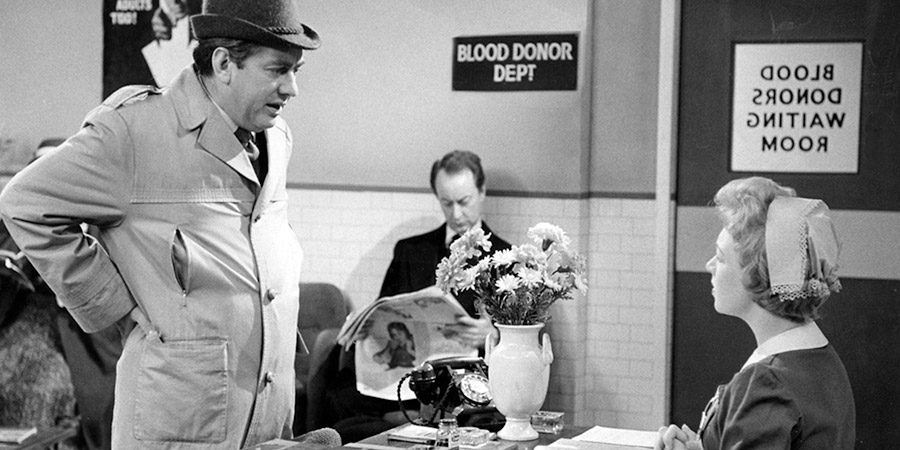
Whitfield would always have to put up with 'difficult' male performers (she had grown used to having to get through scenes stroking Frankie Howerd's hair without horrifying him by dislodging his wig, and she had to spend all of The Blood Donor episode - and all of the subsequent others - trying to interact with Tony Hancock whilst he stared blankly over her shoulder reading his cue cards), and she would have to be similarly stoical about the need to avoid bruising many other famously fragile male egos (Peter Sellers, for instance, would end up erasing her fine contribution to one of his records because he feared that she had upstaged him). She got on with Terry Scott, therefore, because she knew that she had to, and she knew how to.
She proved so effective - and artful - at working with him on-screen whilst managing his off-screen moods ('He couldn't resist picking on someone in the show and having a go at them,' she later recalled. 'He never tried it with me. I think he knew I'd answer back') that they ended up being paired as husband and wife in two hugely popular sitcoms: Happy Ever After (1974-9) and Terry & June (1979-87). These two shows ran seamlessly into each other: the former featured Terry and June Fletcher, a middle-aged, middle-class suburban couple, while the latter featured Terry and June Medford, a middle-aged, middle-class suburban couple.
They were a little more interesting and entertaining than legend would have it. Once a new wave of comedy, of a more irreverent, youth-oriented and aggressive nature, broke into television during the early 1980s, the likes of Terry & June (along with the jinglingly over-familiar Bell Hop - its cosily twee, elasticated-waistband of a signature tune) were simply the most obvious and easiest targets for slamming with symbolic disdain.
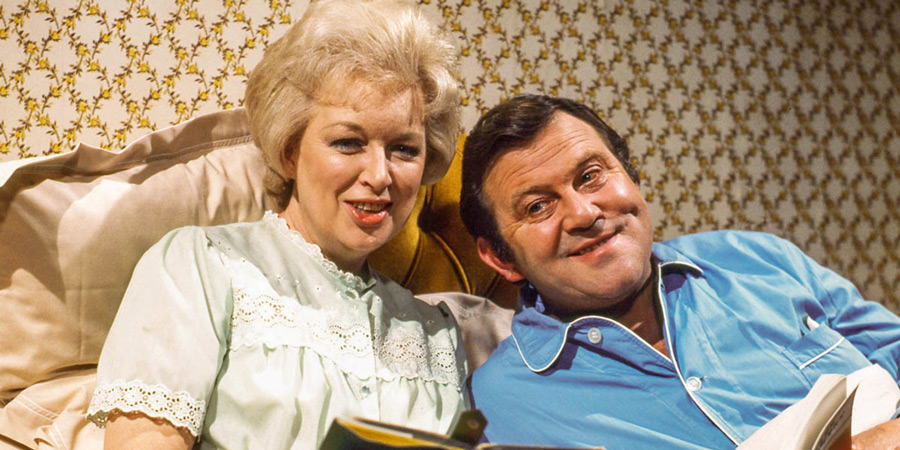
The shows themselves, however, were actually fairly valid, if very safe and increasingly formulaic, studies into and of the real-life phenomenon of middle-aged, middle-class, suburban mundanity (fluffed up with the odd frisson of existential crisis) after the children have flown the nest. They struck a chord with a certain section of the nation (about 15 million of whom watched on a regular basis), which is the main reason why they went on for so long.
Scott and Whitfield had their respective comic roles to play - Scott as the big, self-obsessed, grown-up baby, and Whitfield as the long-suffering wife who often has to behave more like a mother (and that relationship, for better or for worse, also struck a chord) - and they played them very well. The partnership had a conventional double act dynamic - Scott, ostensibly, was the dominant funny man, Whitfield was the subservient feed, and the scripts, which were all written by men, were usually shaped to reflect that distinction - but due to Scott's comparative superficiality (his stagey swooping and soaring tones and rhythms were so habitual that they drained the material of some of its believability) and Whitfield's constant subtlety (she used her eyes so well - her high-lidded stares, for instance, were exceptionally eloquent, as were her sly sideways glances - that she didn't need so many lines, and no one else could find so many different intonations and intimations in a word such as 'dear'), it was often her, rather than him, who won the best laughs.
The storylines were reflective of the prosaic prejudices of the time - Terry is out at the office, June is inside at home; Terry is in the kitchen checking the accounts while June is out at the shops; Terry complains that the household chores are being neglected while June takes a temporary job; Terry tries to rest while June moans that she needs help with the gardening; Terry goes off to play a cricket match and takes June along to make the tea - and the scripts relied heavily on the recognition humour to be elicited from the relationship to keep the audience effectively engaged:
JUNE: I'm trying to pack.
TERRY: Do it in the morning.
JUNE: At half-past four? Oh, well, I'm nearly finished. I just can't find you a pair of socks.
TERRY: Well, what are those, then?
JUNE: Yes, that's the only pair that I can find.
TERRY: Well, I mean, I only need one pair. We're only going for a couple of days.
JUNE: Supposing your feet get wet?
TERRY: Well, then, I'll put those on.
JUNE: Supposing your feet get wet twice?
TERRY: ...It's not worth an argument, is it? Take two pairs, then.
JUNE: Well, that's the whole trouble - you don't seem to have two pairs.
TERRY: Oh, June, for Heaven's sake, come off it! [He pulls out a drawer] I mean, look - socks, dozens of them! Dozens of socks! What's that, then? If you don't mind my saying so, the trouble is you don't work to a system. Now get that case off the bed. Dear oh dear! All you have to do is lay them out and classify them according to their colours: brown, blue, grey, maroon...and then all you need to do is match them up into pairs.
JUNE: Well - go on, then.
TERRY: Grey...grey...yellow...er...well, that's odd...er, all we have to do now is match them into pairs...
JUNE: Yes. That's all.
TERRY: Well, that's odd. All of the, er, greys seem to be different.
JUNE: And the browns and the blues.
TERRY: Well - what's happened?
JUNE: I don't know.
TERRY: Well, that's odd. It's ridiculous. I mean, there's not one single pair amongst the lot of them.
JUNE: Exactly. So if you've finished playing solitaire with your socks, you can put them all away and I can get on with the packing.
TERRY: But...what've you done with them?
JUNE: What have I done with them???
TERRY: Yeah. You're the one that washes them.
JUNE: And you're the one that wears them.
TERRY: Yeah, but they can't disappear when I'm wearing them! I mean, if a sock suddenly vanished while I was walking down the street, I'd notice. One leg would be shorter than the other. I'd limp. And If I didn't notice it then I'd notice it when I took me shoes off.
JUNE: Well, I haven't got them.
TERRY: I'm not saying you have, I'm not suggesting that. I'm merely suggesting as a mere supposition that, you know, that, if my socks do vanish, then they vanish while they're in your charge.
JUNE: Look: I wash them, and I look through them, and if it's worthwhile I darn them.
TERRY: Ah! And supposing it isn't worthwhile?
JUNE: Well, then, I throw them out - there's no point in keeping them, is there?
TERRY: Exactly.
JUNE: I don't know what you do with some of them. I'll show you. Now look here: that is one of your socks. [She puts her hand inside a discarded sock with a large hole in the sole]
TERRY: Are you sure?
JUNE: Well, what does it look like?
TERRY: A very small balaclava helmet.
JUNE: There's no point in darning it, is there? I mean, it would be quicker to knit you a new one!
TERRY: That is what happened! I mean, when you throw out a sock, I mean, do you find its partner, its match, and throw that out as well?
JUNE: No, not normally, no.
TERRY: Well, that is the answer, isn't it? That's why I haven't got a pair of socks. These are the survivors!
Even when, such as in the above scene, the writing was better than usual, it was hardly the most comically inspiring dialogue with which to work (that was, and is, the problem about a sitcom about banality - it tends to generate banal conversations), but Whitfield, especially, did well enough with it to become something of an icon of the era for long-suffering and slyly wise-cracking wives and partners. The enduring success of both these shows, however, kept her stuck right where she was: at a time in her acting life when she could and should have been progressing on to solo, starring, vehicles, she was stuck with Scott, her name still preceded in the titles by that custodial ankle tag of an 'and'.
Her sheer usefulness as a versatile performer would ensure that, in later years, right up to her death (aged ninety-three) in 2018, she would keep unusually busy for a 'mature' woman in her industry. She did the odd 'straight' role in the soaps - as May in Coronation Street and Sister Ruth in EastEnders - made the almost obligatory guest appearance in Doctor Who, and was embraced by those women - such as Dawn French and Jennifer Saunders - who were now enjoying the kind of power and promotion that she had always been denied.
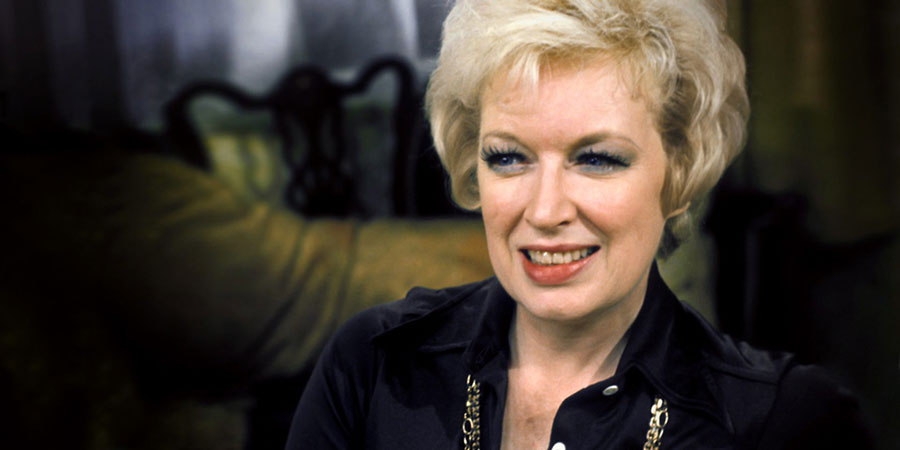
She also thrived on the radio, especially as a regular (for seventeen years) in The News Huddlines. It was there, with its fast-moving and flexible comic current affairs format, that she could better showcase her remarkable range of characterisations, playing everyone from Margaret Thatcher, Norma Major and The Queen to sultry Italian movie stars, dotty dowagers, fierce police women, toothy TV presenters and sundry supermodels.
There would never, however, be her own version of a vehicle such as Frost or Porridge or Phoenix Nights. There were words but no deeds when it came to acknowledging her talent.
Roy Hudd famously, or rather infamously, described June Whitfield as 'The Comics' Tart'. It was meant affectionately, of course, but it did, nonetheless, convey much about the climate of the time in British comedy. Would a similarly gifted and versatile male performer have been dubbed 'The Female Comics' Gigolo'? No. They would have been called 'Ronnie Barker', or 'Dick Emery' or, yes, 'David Jason'.
It should have been the same for her. It was her talent that mattered, and her talent merited exactly the same respect.
That is surely the right and proper way to remember June Whitfield. She was a bona fide great of British comedy, and was peerless at what she did.
It was June Whitfield...and the rest.
Help us publish more great content by becoming a BCG Supporter. You'll be backing our mission to champion, celebrate and promote British comedy in all its forms: past, present and future.
We understand times are tough, but if you believe in the power of laughter we'd be honoured to have you join us. Advertising doesn't cover our costs, so every single donation matters and is put to good use. Thank you.
Love comedy? Find out more...And June Whitfield: The Autobiography

In a 56-year career spanning Take It From Here to Absolutely Fabulous, June Whitfield's presence in a show has always been a hallmark of quality. She writes perceptively about the great comics she has known in her long professional life, and views the changing fashions in television.
First published: Thursday 2nd November 2000
- Published: Wednesday 31st October 2012
- Publisher: Corgi Books
- Pages: 416
- Catalogue: 9780552167963
![]() Buy and sell old and new items
Buy and sell old and new items
Search for this product on eBay
BCG may earn commission on sales generated through the links above.
- Published: Tuesday 13th November 2012
- Publisher: Audible.com
- Minutes: 128
![]() Buy and sell old and new items
Buy and sell old and new items
Search for this product on eBay
BCG may earn commission on sales generated through the links above.
- Publisher: Bantam Press
- Pages: 304
- Catalogue: 9780593045824
![]() Buy and sell old and new items
Buy and sell old and new items
Search for this product on eBay
BCG may earn commission on sales generated through the links above.
June Whitfield At A Glance: An Absolutely Fabulous Life

A British Comedy Award for Lifetime Achievement, a South Bank Show retrospective, a C.B.E. (she insists it means 'Caught Before Expiry'), twice the recipient of a red book on This Is Your Life and with every major comedy star of the last half-century amongst her most ardent admirers, June Whitfield is a legend: a legend who in her 80s still gets up at dawn to prepare for yet another day in front of the cameras.
In her long and rich career she has kept meticulous scrapbooks and these form the backbone to this highly illustrated account of her life and times. It is peppered with hilarious anecdotes and sage reflections on the cast of stars she has worked with as well as recounting some of the most iconic moments in comedy history. To no one else has the description 'National Treasure' been more appropriate.
First published: Thursday 17th September 2009
- Publisher: Weidenfeld & Nicolson
- Pages: 272
- Catalogue: 9780297855620
![]() Buy and sell old and new items
Buy and sell old and new items
Search for this product on eBay
BCG may earn commission on sales generated through the links above.
Happy Ever After - The Complete Collection

Terry Scott and June Whitfield star in 5 series of the hit sitcom that cemented their comedy-star status across the land, and was later reborn as Terry & June.
Middle-aged couple Terry and June Fletcher expect to settle down in domestic bliss when their children leave home and they are left with a quiet, peaceful house. Their peace, however, is short-lived when ditzy Aunt Lucy (Beryl Cooke) decides she's moving in...
First released: Monday 26th September 2016
- Distributor: Simply Media
- Region: 2
- Discs: 8
- Minutes: 1,230
- Catalogue: 166438
![]() Buy and sell old and new items
Buy and sell old and new items
Search for this product on eBay
BCG may earn commission on sales generated through the links above.
- Distributor: Simply Media
- Minutes: 1,230
- Catalogue: 166438D
BCG may earn commission on sales generated through the links above.
Terry & June - The Complete Collection

Complete collection of the hit comedy series starring Terry Scott and June Whitfield as the Medfords.
For millions of viewers, Terry and June became synonymous with the happily-married, middle aged suburban couple. The bumbling, sometimes pompous, sometimes sympathetic Terry found a perfect foil in June, his understanding but doubting wife. Together they created a partnership that will always be remembered in television history.
This box set includes all 9 series and three Christmas specials.
First released: Monday 23rd October 2017
- Distributor: BBC
- Region: 2 & 4
- Discs: 10
- Minutes: 1,899
- Subtitles: English
- Catalogue: BBCDVD4183
![]() Buy and sell old and new items
Buy and sell old and new items
Search for this product on eBay
BCG may earn commission on sales generated through the links above.

